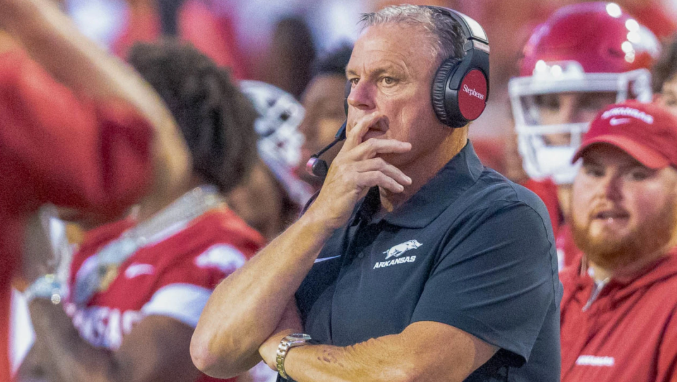
FAYETTEVILLE, Ark. — It’s been quite some time since Arkansas notched more than nine wins in a single season.
To revisit that kind of success, you’d have to turn back the pages to 2011—a memorable year when the Razorbacks climbed to No. 3 in the AP Top 25 poll, their highest ranking since 1978.
Though that level of competitiveness feels distant now, Arkansas still finds itself grouped with two fellow SEC programs and a Big Ten powerhouse—schools often viewed as college football blue bloods.
It’s no surprise that Arkansas football has settled into a state of consistent mediocrity, especially given the athletics department’s cautious approach to adapting in today’s rapidly evolving college sports landscape.
When NIL (Name, Image, and Likeness) reshaped college football, the Razorbacks had a prime opportunity to build on the momentum of their nine-win 2021 season. For a moment, it looked like they were ready to take that next step, securing key transfers like Dwight McGlothern, Drew Sanders, Jadon Haselwood, and Landon Jackson.
But what followed was a 2022 season derailed by injuries across the roster, and head coach Sam Pittman has struggled to find stable ground since.
What could have been a breakthrough campaign instead turned into a rollercoaster of inconsistency—one filled with enough twists and turns to leave fans dizzy.
Arkansas opened the season with a promising 3-0 start, including statement wins over No. 23 Cincinnati and South Carolina. But the cracks quickly showed, particularly in the secondary, which was repeatedly exposed by opposing offenses.
At one point, defensive coordinator Barry Odom’s unit ranked among the worst not only in the NCAA, but also across NAIA and JUCO levels—allowing a staggering 316 passing yards per game.

By midseason, Arkansas coaches were so desperate for depth in the secondary that they began shifting players from other positions—most notably wide receiver Quincy McAdoo. Surprisingly, the move paid off, at least temporarily stabilizing a struggling unit.
Still, the program has settled into a familiar pattern: a 6-6 regular season and a sense of stagnation that has frustrated a fanbase yearning for a return to the glory days.
Injuries derailed what could have been a special 2022 season, and the follow-up in 2023 failed to inspire much confidence or momentum.
That’s the nature of coaching, especially in today’s rapidly changing college football landscape.
From 1998 to 2011, the Razorbacks were consistently on the cusp of breaking into the SEC’s elite. Now, they need a jolt—whether through bold leadership, aggressive recruiting, or full buy-in to the modern era of NIL and the transfer portal—to make that leap once again.
Houston Nutt built a foundation based on sustainability, and that groundwork allowed Bobby Petrino to elevate the program to heights unseen since the days of Lou Holtz patrolling the sidelines.
When Arkansas hired Bret Bielema away from Wisconsin, it seemed like the program would stay on track for double-digit win seasons behind a hard-nosed, physical brand of football.
On paper, Bielema looked like a home-run hire—someone who could keep the Razorbacks nationally relevant. But that potential never fully materialized, as his teams consistently fell just short of breaking through. Still, if nothing else, Bielema had a way of keeping his players engaged. His teams never quit, battling to the bitter end of his tenure.
Unfortunately, the weight of a 17-game SEC losing streak to begin his stint proved too much. Even though seven of those losses came by one possession, the damage was already done—both in the standings and in the minds of the fanbase. The psychological toll gave rise to what some now call “Battered Hog Syndrome,” a belief among Arkansas supporters that if something can go wrong, it inevitably will.
That pessimism has even bled into other sports, including men’s basketball and baseball—programs that have experienced legitimate success but still carry the scars of repeated heartbreak.
Farmer’s Insurance may have coined the phrase, “We know a thing or two because we’ve seen a thing or two,” but Razorback fans could rightfully claim it as their own. They’ve lived it.
Being stuck at 6-6 isn’t rock bottom, but it’s far from where Arkansas aspires to be.
Maybe it’s time for the fanbase to shift its approach. Back Sam Pittman, trust the staff to coach, and fully invest in the program—financially and culturally. Maybe it’s time to stop venting on social media and start backing the Brinks truck.
Because at this point, the only real way forward is to land a generational recruiting class—like the one in 2008—and hit the transfer portal with aggressive intent.
That’s what it will take to truly turn the tide.

Leave a Reply